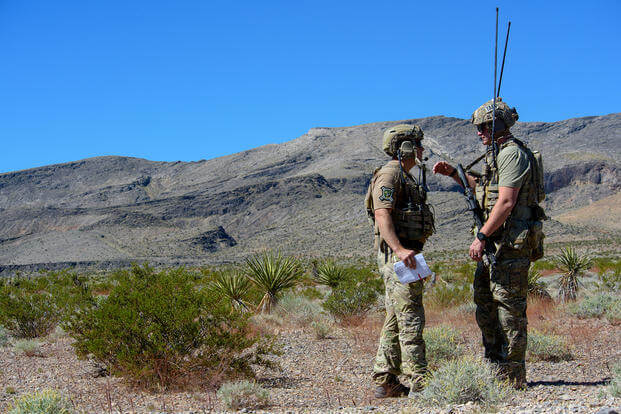Air Force Special Warfare Jobs? Most Americans Aren’t Familiar and That’s a Problem for Recruiting.

A vast majority of Americans know little or nothing at all about the Air Force‘s special warfare jobs, an issue highlighted in a new think tank study as the service has struggled to recruit for those tough jobs.
The Rand Corp., a federally funded think tank focused on military issues, released a study last week detailing the issues the Air Force has faced in getting recruits to join Special Warfare careers, known as AFSPECWAR, such as combat control, pararescue, special reconnaissance and the Tactical Air Control Party fields.
And while other service branches have widespread public and cultural recognition for their special operators — such as Navy SEALs, Army Green Berets and Marine Raiders — data from the report shows many are unfamiliar with those similar Air Force jobs.
Read Next: Marine Recruiter Who Wrote ‘Memoir’ About Teenage Recruit Sentenced to Prison
A study detailed in the report indicated that “82% of the American public has limited to no familiarity with AFSPECWAR,” with 58% of those people being completely unaware and 24% familiar only with the name.
“These results stand in stark contrast when compared with Navy SEALs and the Army SF. Only 4% of the American population report never hearing about the Navy SEALs, and only 8% have never heard about the Army SF,” the report detailed. “These results confirm Air Force beliefs that there is limited awareness of AFSPECWAR.”
Part of that lack of public recognition comes from the job itself, according to retired Chief Master Sgt. Eric Benken, who served as the Air Force’s top enlisted leader from 1996 to 1999.
Benken told Military.com that Air Force special operators often refer to themselves as the “quiet professionals,” and that he’s not surprised there hasn’t been as much attention put on those jobs.
“I think a lot of that just has to do with the roles that they have, as far as you know, media coverage,” Benken said. “It’s extremely difficult to be in special operations … physically demanding, psychologically demanding.”
Some trainees told Rand researchers that the lack of recognition was actually a plus for them.
“What drew me in is just how quiet the [combat control team] community was,” one special operations trainee told researchers. “I mean, the SEALs, the Green Berets, and everybody knows what those are, but I like a job where … the outside world does not really know, but yet, you’re crucial to those units as well, and that got me more on board with this program.”
While that quiet professionalism may appeal to some trainees once they join the career field, it makes recruiting for the jobs difficult.
The Rand report found that “the AFSPECWAR brand is relatively unknown among the general public,” according to the think tank’s summary of their findings.
But even those who do find out about the career field, mostly through word of mouth, making sure they’re qualified to serve in the job is another hurdle.
Researchers found that the “highly demanding process historically resulted in less than 30% of candidates completing initial skills training,” which is well below other Department of the Air Force careers.
The Air Force struggled with recruiting in fiscal 2023 and missed its recruiting goals by nearly 10% — the first time that target had been missed since 1999. Those effects were felt in the special warfare careers.
“In addition to canceling an entire class in fiscal year (FY) 2023 due to lack of recruits, AFSPECWAR has consistently been unable to reach recruiting targets and has had trouble building a sizable pool of recruits in the delayed entry program who are preparing to meet initial fitness requirements,” the Rand report said.
The Air Force turned the tide on its recruiting slump in fiscal 2024, scraping by with 27,139 of the 27,100 required, Military.com reported last month. Air Force officials hope to increase that enlisted active-duty goal to 32,500 in fiscal 2025.
In order to do that, Brig. Gen. Christopher Amrhein, commander of the Air Force Recruiting Service, told Military.com in an interview last month that they’re hiring up to 370 more personnel to meet those goals with “about 55 Special Warfare recruiters” being a part of that number.
The Rand report recommended that the Air Force’s 330th Recruiting Squadron “should assume responsibility for leading the AFSPECWAR recruiting enterprise,” should grow efforts to recruit new special operators from within the Air Force, and should locate more offices in areas with more 18- to 24-year-olds, veterans and overall healthier communities to find new recruits.
Related: Ask Stew: What You Should Know About Air Force Special Warfare
Related
A top recruiter says sports marketing roles are hot right…
Jobs are opening up in the sports industry as teams expand and money flows into the industry.Excel Search &
Public employees and the private job market: Where will fired…
Fired federal workers are looking at what their futures hold. One question that's come up: Can they find similar salaries and benefits in the private sector?
Mortgage and refinance rates today, March 8, 2025: Rates fall…
After two days of increases, mortgage rates are back down again today. According to Zillow, the average 30-year fixed rate has decreased by four basis points t
U.S. economy adds jobs as federal layoffs and rising unemployment…
Julia Coronado: I think it's too early to say that the U.S. is heading to a recession. Certainly, we have seen the U.S. just continue t










